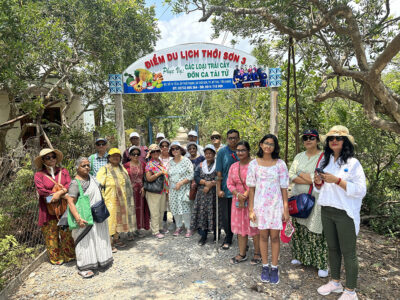As you plan your exciting journey from India to Vietnam, understanding the local Vietnam currency, payment systems, and financial etiquette is essential for a smooth, enjoyable, and value-for-money holiday. This guide covers everything you need to know about money matters in Vietnam. Essential Vietnam money guide for Indian tourists! Learn about Vietnamese Dong (VND), INR exchange, ATMs, card payments & tipping. Get tips for a smooth & affordable trip.
Understanding the Vietnamese Dong (VND) – Vietnam’s Official Currency

What is the Currency of Vietnam? The official currency in Vietnam is the Vietnamese Dong, denoted by the symbol ₫ or abbreviation VND. You’ll hear and see VND used everywhere for everyday transactions.
Denominations: Vietnamese banknotes include a mix of older small paper bills and more common polymer bills for larger values. Coins are not used. Common denominations you’ll handle are:
- 1,000 VND, 2,000 VND, 5,000 VND (Paper)
- 10,000 VND, 20,000 VND, 50,000 VND, 100,000 VND, 200,000 VND, 500,000 VND (Polymer)
Handling the Zeros: Don’t be intimidated by the large numbers! A quick tip: mentally remove three zeros (000) to simplify. For example, 50,000 VND becomes 50.
Quick Conversion Tip (Approximate): To roughly estimate USD, remove three zeros and divide by 23 (e.g., 50,000 VND ≈ 50 / 23 ≈ 2.15 USD).
Important Note: The 20,000 VND bill (light blue) and the 500,000 VND bill (darker blue) can look similar. Double-check before paying!
INR to VND Exchange Rate
The exchange rate between the Indian Rupee (INR) and the Vietnamese Dong (VND) fluctuates. It’s crucial to check the latest rates before and during your trip. As a rough guide (check live rates for accuracy!), 1 INR is approximately equal to 290 – 300 VND. This means your Rupees go a long way, making Vietnam an affordable destination for Indian tourists.
How to Get Vietnamese Dong (VND) for Your Trip
Having local Vietnamese currency upon arrival is essential. Here’s how to acquire VND:
Currency Exchange:
- Before You Leave (India): Exchange a small amount of INR to VND in India for immediate expenses like taxis or water upon arrival. Rates might not be the best.
- Vietnam Airports (e.g., Da Nang, Hanoi, Ho Chi Minh City): Currency exchange counters are available just before the exit gates. Convenient, but rates might be less favourable.
- Banks in Vietnam: Generally offer better exchange rates. However, it can be slower, require your passport, and operate during limited business hours.
- Authorized Money Changers: Found in tourist hotspots and cities. Compare rates between a few vendors before exchanging. Reputable ones offer competitive rates.
- Gold and Jewelry Shops: Some shops (like those historically found on Ha Trung Street in Hanoi) offer exchange services. Be cautious, compare rates carefully, and ensure no hidden fees.
- Recommendation: Use reputable currency exchange offices or local banks for the best rates. Avoid unreliable street vendors. Always ask for a receipt.
ATMs in Vietnam:
- Availability: ATMs are widespread in Vietnamese cities and towns. You’ll find them easily outside airports and near hotels. Ask your hotel reception if you need help locating one.
- Card Acceptance: Most ATMs accept international cards like Visa and Mastercard, commonly issued by Indian banks. Over 20,000 ATMs nationwide accept Visa.
- Withdrawal Limits: These vary. Local bank ATMs often have lower limits per transaction (e.g., 2-3 million VND), while international bank ATMs (like HSBC, Citibank) may allow higher amounts (e.g., 5-10 million VND).
- Fees: Be aware! Your home bank (in India) might charge a foreign transaction fee, and the local Vietnamese ATM might also impose a withdrawal fee. Check with your Indian bank beforehand about fees and compatibility.
- Important Travel Tip: Notify your Indian bank about your travel dates to Vietnam to avoid your card being blocked for suspicious activity.
Payment Methods Accepted in Vietnam

Cash
- Essential: Cash is king, especially for street food, local markets, small shops, cyclo or xe om (motorbike taxi) rides, and in rural areas. See more: Transportation in Vietnam
- Tip: Always try to carry a mix of denominations, including small bills (10k, 20k, 50k VND), as vendors may struggle to provide change for large 500k notes for small purchases.
Credit and Debit Cards
- Acceptance: Widely accepted in hotels, larger restaurants, boutiques, tour operators, spas, and supermarkets in major cities and tourist areas. Visa and Mastercard are the most common.
- Fees: Be aware of potential foreign transaction fees from your Indian bank and dynamic currency conversion (DCC) fees if offered – it’s usually better to pay in VND.
- Contactless Payments: Many businesses now accept Visa contactless payments (“tap-to-pay”), which is convenient and secure as your card doesn’t leave your hand.
Mobile Payments (QR codes)
- Growing Trend: Apps like MoMo, ZaloPay, and VNPay using QR codes are extremely popular among locals, especially in urban areas. GrabPay (within the Grab app for transport and food delivery) is also widely used.
- For Tourists: While convenient, using local apps often requires a Vietnamese phone number or bank account. Check if any international apps you use are compatible, but don’t rely solely on them. Cash and cards remain more practical for most Indian tourists.
Managing Costs: Budgeting & Saving Money in Vietnam
Vietnam offers incredible value for money. Here are typical costs (approximate) and tips to save:
Typical Costs (Approximate)
- Street food meal (Pho/Banh Mi): 20,000 – 50,000 VND (₹65 – ₹165)
- Local coffee (Cà phê sữa đá): 15,000 – 25,000 VND (₹50 – ₹85)
- Bottle of water (1.5L): 10,000 – 15,000 VND (₹35 – ₹50)
- Cappuccino in a cafe: 55,000 VND (₹180)
- Meal in a mid-range restaurant: 100,000 – 200,000 VND per person (₹330 – ₹660)
- Short inner-city taxi ride: 35,000 – 100,000 VND (₹115 – ₹330)
- Budget guesthouse/hostel: From 200,000 VND/night (₹660)
- Mid-range hotel: From 700,000 VND/night (₹2,300)
Money-Saving Tips for Indian Travellers
- Eat Local: Embrace delicious and cheap street food.
- Bargain Politely: Haggling is expected in markets. Start lower, be polite, and meet somewhere in the middle. Compare prices first.
- Use Local Transport: Opt for public buses, or Grab (app for bikes/cars with fixed prices). Negotiate fares for cyclos or xe om before starting the ride.
- Smart Accommodation: Use booking sites (Booking.com, Agoda) for deals on guesthouses or hotels. Consider homestays for cultural immersion.
- Refill Water Bottles: Carry a reusable bottle and refill it to save money and reduce plastic waste.
- Look for Happy Hours: Many bars and restaurants offer deals on drinks and food.
- Enjoy Free Activities: Explore parks, lakes (like Hoan Kiem Lake in Hanoi), temples (check entry fees), and wander through bustling markets.
Useful tips: Haggling is a common practice in Vietnam, especially in markets and with street vendors. Practice polite negotiation skills, start with a lower offer and be prepared to compromise.
Tipping in Vietnam
- General guidelines: Tipping is not customary in Vietnam, but it is becoming more common in tourist areas. It is not expected, but appreciated for excellent service.
- Restaurants: Suggest tipping 5-10% for exceptional service or rounding up the bill.
- Hotels: Suggest tipping bellhops for luggage assistance and housekeeping for good service.
- Tours: Suggest tipping tour guides for excellent service and insights.
- Spas/Salons: A small tip for good service is often appreciated.
Context: Remember a local meal costs around 30,000-50,000 VND, giving context to the value of your tip.
Safety and Security with Your Money
General Safety: Vietnam is generally a very safe country for travellers. However, use common sense.
Practical Tips:
- Use the hotel safe for spare cash, passports, and valuables.
- Keep wallets and phones secure, especially in crowded markets or buses.
- Be aware of your surroundings.
- Counterfeit Money: While not rampant, be aware of fake notes, especially the 500,000 VND bill. Exchange money only at reputable places. Familiarize yourself with the look and feel of polymer notes (they have clear windows).
- Scams: Be cautious of common travel scams like inflated taxi fares (use metered taxis or Grab) or overly pushy vendors.
Where are the best places for Vietnamese currency exchange?
Exchanging your home currency for Vietnamese Dong is one of the first steps when arriving in Vietnam. You’ll find several options available, each with its own advantages and disadvantages:
- Airports: Currency exchange booths are readily available at most airports in Vietnam, providing a convenient option for travelers, especially those arriving late at night or early in the morning. However, airport exchange booths often have less favorable rates compared to other options.
- Banks: Banks typically offer the best exchange rates for Vietnamese Dong, but the process may take longer, requiring additional documentation like your passport or visa. It’s also important to note that bank hours may be limited, so it’s best to check in advance.
- Gold and jewelry shops: While more conveniently located than banks, gold and jewelry shops tend to have higher exchange rates and may include hidden fees. Always carefully review the fees associated with the transaction before exchanging your money.

To maximize your savings and avoid hidden costs, it’s recommended to research and compare exchange rates and fees among different options before exchanging your currency. Taking the time to find the best deal can save you money and ensure you have the necessary Vietnamese Dong to fully enjoy your travels.
Other useful tips
Here are some key tips to help you navigate payments and currency exchange in Vietnam:
- Budgeting: Create a realistic travel budget and factor in currency exchange rates and potential transaction fees.
- Scams: Be aware of potential scams, such as fake money changers or inflated taxi fares.
- Exchange rates: Check current exchange rates and compare different options before exchanging money.
- ATMs: Before you travel, check with your bank to ensure your debit or credit card is compatible with local ATMs in Vietnam.
- Counterfeit money: Counterfeit banknotes, particularly the 500,000 VND note, can be a problem in Vietnam. To avoid falling victim to counterfeit money, only exchange currency at reputable places like banks or authorized exchange bureaus.
- Keep small bills handy: Many vendors and small businesses may not have change for larger denominations, so it’s helpful to have a mix of smaller bills on hand for everyday transactions.
- Notify your bank: If you plan to use your credit or debit card in Vietnam, inform your bank in advance. This will help avoid any issues with your account being flagged for suspicious activity when you’re making international transactions.

FAQs for Indian Travellers
Is Vietnam expensive for Indian tourists?
No, Vietnam is generally considered a very affordable destination for Indian travellers due to the favorable INR to VND exchange rate and low cost of living for food, accommodation, and transport.
Should I exchange INR to VND in India or Vietnam?
It’s good to exchange a small amount in India for initial needs. For larger amounts, you’ll often get better exchange rates at banks or authorized money changers in Vietnam.
Are credit cards widely accepted in Vietnam?
They are increasingly accepted in tourist areas, hotels, and larger establishments (Visa/Mastercard mainly). However, cash (VND) is essential for smaller vendors, markets, and rural areas. Always carry some cash.
Are there extra fees for using ATMs or exchanging currency?
Yes, potentially. Your Indian bank may charge foreign transaction fees for card use/ATM withdrawals. Local Vietnamese ATMs might also charge a fee. Currency exchange bureaus might have commission fees (though many advertise “no commission”). Always ask about fees beforehand.
Can I rely solely on mobile payment apps like Google Pay or PhonePe from India?
No, Indian mobile payment apps generally won’t work directly for payments in Vietnam. While local apps (MoMo, VNPay) are popular, they usually require local setup. Stick to cash and internationally accepted cards (Visa/Mastercard).
Can I Use Indian Rupees (INR) in Vietnam?
- Generally No: It is very uncommon to use Indian Rupees (INR) directly for transactions in Vietnam. Some large hotels or shops in major tourist hubs might accept USD, but rarely INR.
- Best Practice: Exchange your INR to Vietnamese Dong (VND) either before you leave India or upon arrival in Vietnam. Using VND ensures wider acceptance, better rates, and avoids potential confusion or poor on-the-spot exchange rates offered by vendors.
Conclusion
Understanding the Vietnamese Dong (VND), knowing how to exchange currency smartly, and utilizing the right payment methods are key to a hassle-free trip to Vietnam for Indian tourists. Embrace using cash for local experiences, have cards for larger expenses, and always keep safety in mind. By managing your Vietnam money wisely and embracing local practices like bargaining, you can fully immerse yourself in the rich Vietnamese culture, savor the incredible cuisine, explore the stunning landscapes, and make the most of your unforgettable Vietnamese adventure.
Read more:











